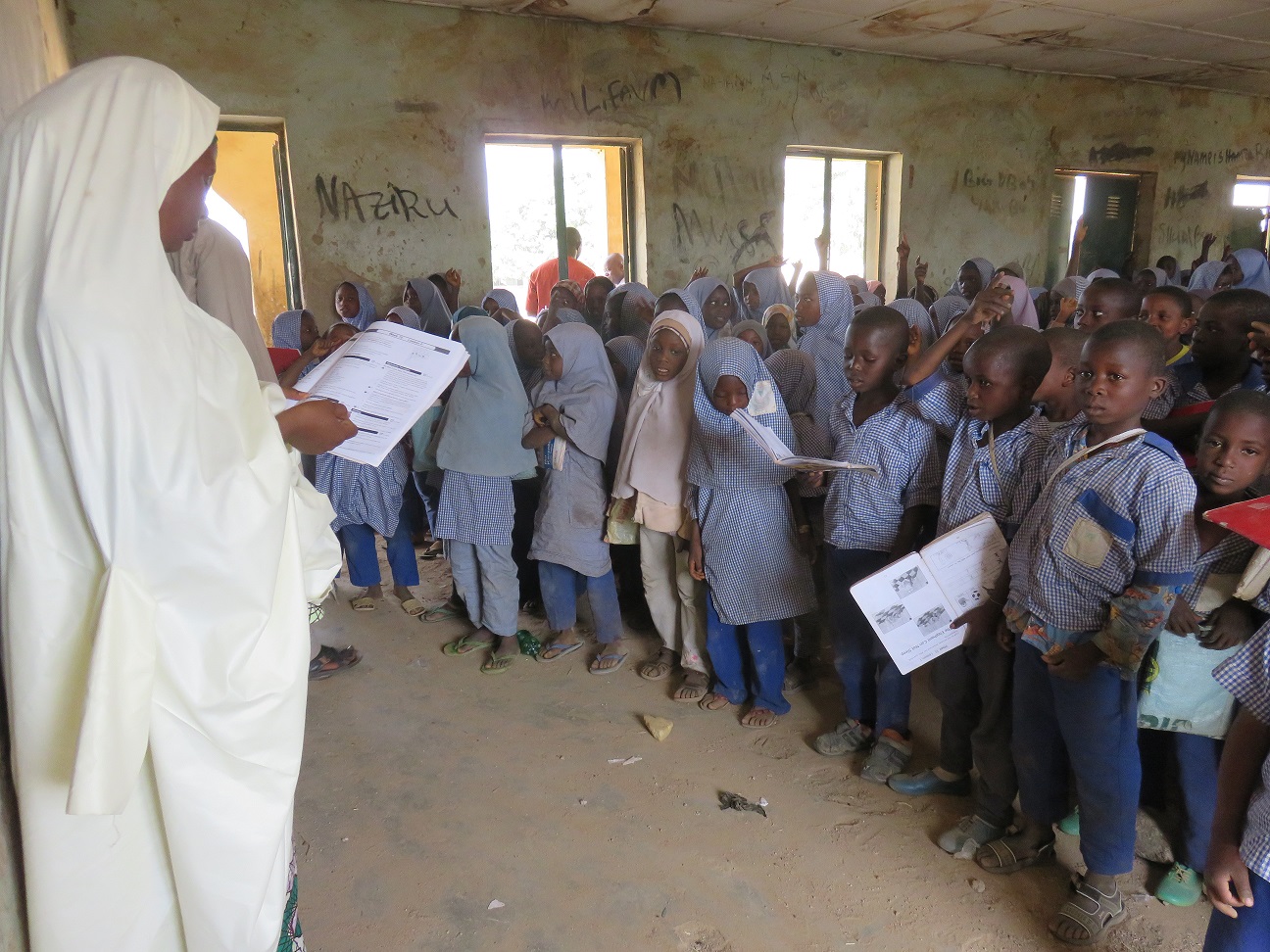Bauchi, Nigeria– An early grade reading program introduced in more than 2,000 schools in Northern Nigeria’s Bauchi and Sokoto states is creating demand for basic education in very poor communities.
The Northern Education Initiative Plus project rolled out a new early grade reading curriculum called “Let’s Read! Mu Karanta!” program for pupils in Primary 1-3 with a transition to English in Primary 4.
Before implementing at school level, the project collaborated with more than 100 local and international experts to develop 15 teacher guides and 15 pupil books with 750 lessons.
The books contain illustrative pictures and local stories promoting social values that are attractive to children and are designed to ensure that by Primary 3 they are reading text that is much longer in Hausa and English.
More than 10,000 teachers were trained to use these materials and continue to receive coaching and mentoring on early grade reading instruction and techniques to improve children’s reading skills.
Enrollment rates increase
Six months into rollout in schools, the program is generating so much excitement amongst community leaders, parents and children. School authorities are overwhelmed with the number of requests to enroll children into schools. This is new especially for public schools where retention rates are low.
Before the early grade reading program, Magama Gumau Primary School in Toro Local Government Education Authority of Bauchi state faced a serious challenge of low enrollment of learners. Now, enrollment has risen by 16% from 765 pupils to 895.
“Before the program most children did not care to come to school even when they came retaining them was a problem. But the Initiative came and trained teachers, gave pupils textbooks and the children are learning making the school very lively,” says head teacher of the school, Garba Adamu Tilde.
Many families in Toro local government struggle to meet their basic needs. When they learnt that schools were giving children free books, schools like Magama Gumau Primary school began to receive many requests to enroll more children in school than it could accommodate.
These parents also saw other children return home with their books reading and singing within a short while.
Meeting the demand
“These children could not read because they did not have reading materials and their parents could hardly buy for them. But the program has provided books to all primary schools and we are seeing children read in Hausa and English,” says Abdullahi Umar Turaki who is the Chairman of the School Based Management Committee, the community structure representing the voice of beneficiaries in the school.
The committee then came together and advocated to the Local Government Education Authority for additional schools to meet the increasing demand. Two schools were approved in the community so more children get to benefit from the Let’s Read! Mu Karanta! program.
“The communities in this local government came together and volunteers donated their houses to be converted to schools. Presently, even these schools are overcrowded. This is what positive change can bring,” Tilde adds.
Bauchi state government is aware of the increased demand for education amongst parents. It has ordered the renovation of more than 200 primary schools in the state.
“We are aware of these challenges of shortages of classroom furniture and writing materials. The government is keen on education and is taking steps to renovate schools in the state to accommodate more learners,” says Gambo Namorda Sanga, Head of Section Upper Basic in Toro Local Government Education Authority.
[perfectpullquote align=”right” cite=”” link=”” color=”” class=”” size=””]“The communities in this local government came together and volunteers donated their houses to be converted to schools. Presently, even these schools are overcrowded. This is what positive change can bring,” says Garba Adamu Tilde, a head teacher.[/perfectpullquote]
New methods of teaching
A similar situation is playing out in Sokoto state. In Yakubu Science Model Primary School, population of children in primary school has risen by more than 1,000.
“Parents are excited about what is happening in the schools with the reading program. We have received very positive feedback from parents who visit their children in school,” says Muhammad Chiko who is the principal of the school.
The school is also impressed with how teachers’ skills have improved and the response of the children to the program. “We are doing our bit by making sure we provide flashcards and other teaching aids so they can teach effectively,” he says.
A teacher in the school, Sherifat Adio says her pupils are more involved in class lessons since she started applying the “I do, you do and we do” teaching method of the reading program.
“I divide the children into groups, asks them questions and they work together to come up with answers. They are more excited and forthcoming during lessons,” she says.
Comments are closed.


